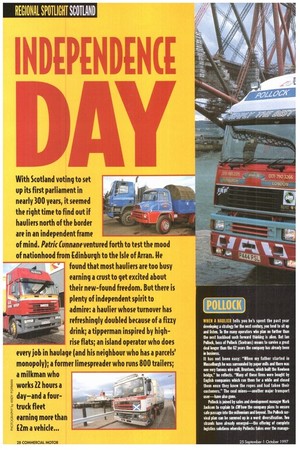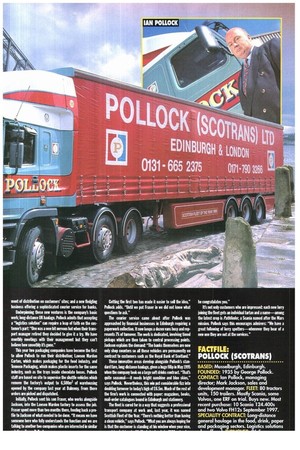POLLOCK WHEN A HAULIER tells you he's spent the past
Page 30

Page 31

If you've noticed an error in this article please click here to report it so we can fix it.
year developing a sirateo for the next centm, you tend to sit up and listen. To the many operators who plan no further than the next backload such forward thinking is alien. But Ian Pollock, boss of Pollock (Scotrans) means to survive a great deal longer than the 62 years the company has already been ii business.
It has not been easy: "When my father started in Musselburgh he was surrounded by paper mills and there was one very famous wire mill, Bruntons, which built the Kowloon bridge," he reflects, "Many of these firms were bought by English companies which ran them for a while and closed them once they knew the ropes and had taken their customers." The coal mines—another major transport user—have also gone.
Pollock is joined by sales and development manager Mark Jackson to explain to CM how the company plans to ensure safe passage into the millennium and beyond. The Polack survival plan can be summed up in a word: iversification. Two strands have already emerged—the offering of complete logistics solutions whereby Pollocks takes over The manage
merit of distribution on customers' sites; and a new fledgling business offering a sophisticated courier service for banks.
Underpinning these new ventures is the company's basic work; long-distance UK haulage, Pollock admits that accepting a "logistics solution" can require a leap of faith on the customer's part "One was a wee bit nervous but when their transport manager retired they decided to give it a try. We have monthly meetings with their management but they can't believe how smoothly it's gone."
This year two packaging companies have become the first to allow Pollock to run their distribution; Lawson Mardon Carton, which makes packaging for the food industry, and Tenneco Packafjng, which makes plastic inserts for the same industry, such as the trays inside chocolate boxes. Pollock staff are based on site to supervise the shuttle vehicles which remove the factory's output to 6,50E02 of warehousing opened by the company last year at 9almeny. From there orders are picked and dispatched.
Initially, Pollack sent his son Fraser, who works alongside Jackson, into the Lawson Manion factory to assess the job. Fraser spent more than two months there, feeding back a profile to Jackson of what needed to be done. "It means we have someone here who fully understands the function and we are talking to another two companies who are interested in similar Getting the first two has made it easier to sell the idea," Pollock adds. "Until we put Fraser in we did not know what questions to ask."
The courier service came about after Mock was approached by financial businesses in Edinburgh requiring a paperwork collection. It now keeps a dozen vans busy and represents I% of trrnover. The work is dedicated, involving timed pickers which are then taken to central processing poitts. Jackson explains the demand: "The banks themselves are now only shop counters so all these vehicles are permanently on contract to customers such as the Royal Bank of Scotland."
These innovative areas develop alongside Pollock's standard fare, long-tistance haulage, Oen a huge fillip ii May 1995 when the company took on a large soft drinks contract "That's quite seasonal—it needs bright sunshine and blue skies," says Polack. Nevertheless, this wit put considerable fin into doubling turnover to today's high of £6.5m. Much of the rest of the finn's work is connected with paper magazines, books, mail-order catalogues bound in Edinburgh and stationery.
The fleet is cared for in a way that suggests a professional transport company at work and, last year, it was named Scottish Fleet of the Year. "There's nothing better than having a clean vehicle," says Pollock. "What you are always hoping for is that the customer is standing at his window when your nice, he congratulates you."
It's not only customers who are impressed: each new lorry joining the fleet gets an individual tartan and a name—among the latest crop is Pathfinder, a Scania named after the Mars mission. Pollock says this encourages admirers: "We have a great following of lorry spotters—whenever they hear of a new one they are out at the services."
FACTFILE: POLLOCK (SCOTRANS)
BASED: Musselburgh, Edinburgh. FOUNDED: 1935 by George Pollock. CONTACT: Ian Pollock, managing director; Mark Jackson, sales and development manager. FLEET: 80 tractors units, 150 trailers. Mostly Scania, some Volvos, one ERF on trial. Buys new. Most recent purchase: 10 Scania 124.400s and two Volvo FH12s September 1997. SPECIALITY CONTRACT: Long-distance general haulage in the food, drink, paper and packaging sectors. Logistics solutions
















































































































